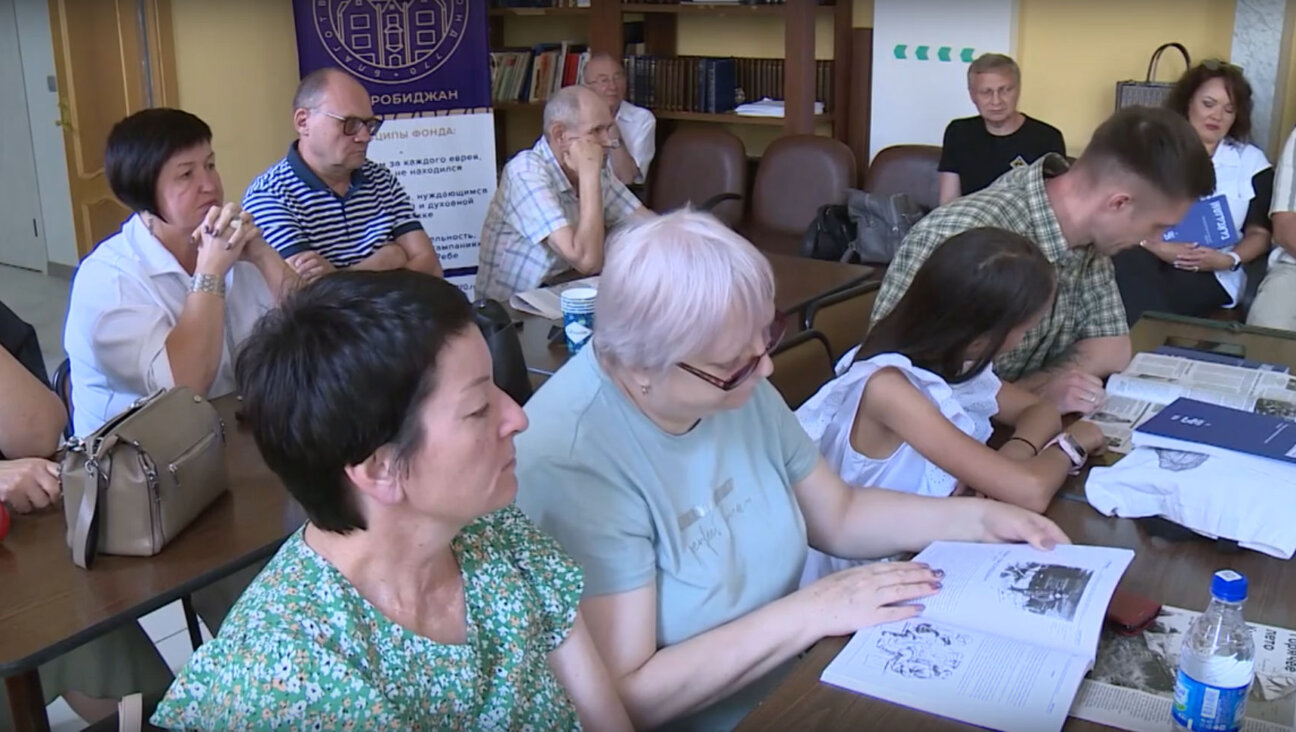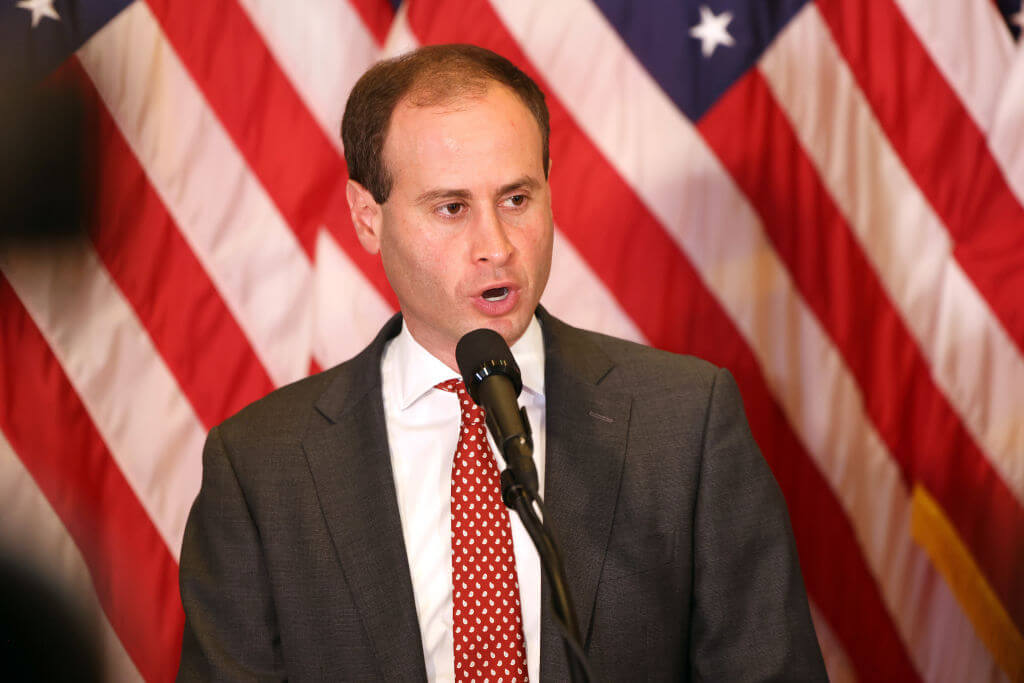Joining the Battle To Capture the Hearts of Young Jews
When Hillel’s newly minted executive, Kinney Zalesne, was in college, the Hillel on her campus at Yale held little appeal for her. For four years, she maintained a skeptical distance from the whole institution.
“To me, Hillel was for people who were only socially comfortable with other Jews and whose cultural interests were mainly Jewish,” said Zalesne, who began her job as executive vice president last Monday. “That seemed narrow to me — less than the universal embracing of the world that I was interested in.”
Since then, alongside a high-powered career that included a two-year stint as counsel to then-attorney general Janet Reno, Zalesne dropped her gentile boyfriend, picked up a Jewish husband and found something in the religion of her parents that Hillel never showed her.
I needed to be engaged in a way that I admired and that was in touch with things that I cared about,” said Zalesne, who is now 38 and a regular prayer leader at her traditional egalitarian minyan in Washington, near Hillel headquarters.
At a time when the Jewish community is grappling with ever-dwindling affiliation among young Jews, Zalesne is a case study in how it might yet win the battle for the hearts of young Jews.
Zalesne plans to put her considerable personal experience to work in leading this effort. She will hark back to her years as a rather disaffected college student, but the more immediately useful experience probably will come from the job she just left, as president of a non-Jewish organization, College Summit, where she worked to help low-income students reach college.
Zalesne and the rest of the staff at College Summit rejected the old nonprofit model, where help was given to the most devoted students, for whom success already was right around the corner. Instead, College Summit used a new mode of charity — known as social entrepreneurship — whereby counselors attempted to win over the kids in the middle of the class, who had more to gain and also more ability to inspire the mass of other kids in the middle of the pack.
“Instead of trying to provoke a change from the top, we worked to find influential kids who could create a cultural change from within,” Zalesne said.
With Hillel, Zalesne similarly imagines an organization that concentrates less of its resources on the ardent Jews and more on the unaffiliated Jews who, as she puts it, could inject Hillel with a measure of “cool” that would draw in other students.
Zalesne points to recent writing by Brandeis professor Jonathan Sarna, who argues that the Jewish leaders of every era have come from the ranks of the young and rebellious — people who understand what it means to reject the establishment. The “swing Jews,” as Zalesne calls them.
She does not know exactly what winning over such students will entail; she has not even been on the job long enough to have business cards printed. But she has some first thoughts about helping Hillel develop into a more visible presence on campuses, sponsoring political and artistic events that might appeal to Jews who don’t come for the services alone.
There are schools already working in this direction. Zalesne mentions the University of Maryland and Ohio State, among others. But she thinks that too many students are facing her own experience. Zalesne grew up in suburban Philadelphia, where she attended a Conservative synagogue regularly, but this did not translate into a continued involvement during college. She only met the rabbi at Yale when she was working with the Episcopal priest on campus to organize an interfaith dialogue.
She was never very taken by the arguments of her mother that she needed to find a nice Jewish boy, or the apocalyptic harping of rabbis about the declining numbers of affiliated Jews.
But during this time she carried some seed of interest from her elementary-school days at Camp Ramah that told her “not to walk away, yet.” After law school, during her first job as a clerk for a federal judge in Philadelphia, something from her past pushed her to try out Friday services at a nearby synagogue, where she found that she was the youngest attendee by a good three decades.
The prayers somehow made sense to her, and in the following weeks she planned a Sabbath dinner at the synagogue for some of her friends. Within a few weeks, the dinner had grown to more than 100 young professionals, gathering to talk about the relevance of Judaism to the lives of their disaffected compatriots.
“I saw this hunger among a group of young people who wanted Judaism to challenge them,” Zalesne said.
Zalesne herself is clearly one of those go-getters who can inspire — exactly the kind she is searching for in today’s collegiate ranks. She went to law school at Harvard and, after a stint in Al Gore’s office, ended up as one of six attorneys on Reno’s staff.
At Zalesne’s wedding in 1998, Reno met a college friend of Zalesne’s who had started College Summit, and the attorney general was so excited about the organization that she encouraged Zalesne to look into it. Shortly afterward, Zalesne left the U.S. Department of Justice to become College Summit’s president and general counsel. Last summer, Reno herself spent four days as a College Summit writing tutor, helping students put together college essays.
Zalesne says that College Summit put her in touch with elements of Judaism that she never had grasped before. She was a child of affluent parents, so the story of Passover had never had much personal resonance, but as she watched disadvantaged high school students make it to college, she understood for the first time what it meant to “break cycles” of poverty and oppression.
During a Seder that Zalesne held for College Summit folks — most of them non-Jews — she told the story of Exodus to students from rural South Carolina, who were emerging out of their own Egypt in families that had been bound to poverty for generations.
Hillel will be Zalesne’s first job with a Jewish organization. In the last few years, the September 11 attacks and the rising conflict in Israel gave her a sense of urgency about Jewish identity that finally drove her to leave College Summit and make the connection with Hillel. She also has a 2-year-old son whose Jewish future is a matter of some concern. But it is more in Zalesne’s nature to act, not worry.
“You can look at the community and despair about the declining identity and interest,” she said, “or you can look at it and see tremendous freedom and talent and energy.”
A message from our CEO & publisher Rachel Fishman Feddersen

I hope you appreciated this article. Before you go, I’d like to ask you to please support the Forward’s award-winning, nonprofit journalism during this critical time.
At a time when other newsrooms are closing or cutting back, the Forward has removed its paywall and invested additional resources to report on the ground from Israel and around the U.S. on the impact of the war, rising antisemitism and polarized discourse.
Readers like you make it all possible. Support our work by becoming a Forward Member and connect with our journalism and your community.
— Rachel Fishman Feddersen, Publisher and CEO






















